
“My principal reason for going into law is due to the influence of my mom, grandma, and great-grandmother – all strong Anishinaabe women who have endured so much injustice, and still do their part to bring community together.” Darian Doblej, Law’21 (Artsci’18), said these words earlier today as he accepted a scholarship from the Indigenous Bar Association. “They, together, constantly remind me of my place in public service.
“When I was just but a young boy, the eldest of four children, my great-grandmother made me promise…to protect my sisters,” he continued. “How I would realize the promise remained a question until I grew to understand sources of our communities’ pain: colonialism, paternalism, intolerance, and, perhaps most importantly, injustice.”
Doblej and his siblings, members of Whitesand First Nation, grew up on a reserve. He credits his approach to public service as a lesson given by his community. “Finding a way to give back to Whitesand for their collective upbringing of me became a necessary goal in life to show how grateful I am for being brought up by the love of an entire community,” he says. “I am now committed to helping communities and nations assert control and jurisdiction over their children; to keep kids in our communities, where they are safest; and to prioritize how our nations have raised our children since time immemorial.”
After becoming his community’s delegate to discussions on child welfare almost a decade ago, he has served as a commissioner of a province-wide Sexual Violence and Harassment on First Nations Communities inquiry and as an advisor to then-Ontario Premier Kathleen Wynne and her cabinet ministers. One of them was the Minister of Children and Youth Services who revamped the centrepiece for all child welfare legislation in Ontario with the Children, Youth, and Family Services Act. Among other things, the new legislation recognized and affirmed First Nations’ ability to govern themselves and take care of their children, and mandated societies to take into account cultural preservation and connection to community when determining the best interests of the child.
Today he stood before jurists and advocates at the Indigenous Bar Association’s 31st Annual Fall Conference in Ottawa. There, he was presented the Indigenous Law Student Scholarship for serving and advancing the interests of Indigenous Peoples with honour and integrity.
“The work I’ve done is about the commitment I’ve made to my matriarchs, elders, children, and youth to work away at unshackling the chains of our colonial master and asserting sovereignty and inherent jurisdiction over our ways of being, doing, and knowing, no matter the instance,” he told the crowd. “It is about improving conditions for future generations and doing my part to help all children grow up with better supports and laws than what I had.
“There is much more work to be done,” Doblej continued. “Work that with your help, each and every one of you, could be realizable for children and families of today, nations tomorrow, and generations to come.”
By Lisa Graham